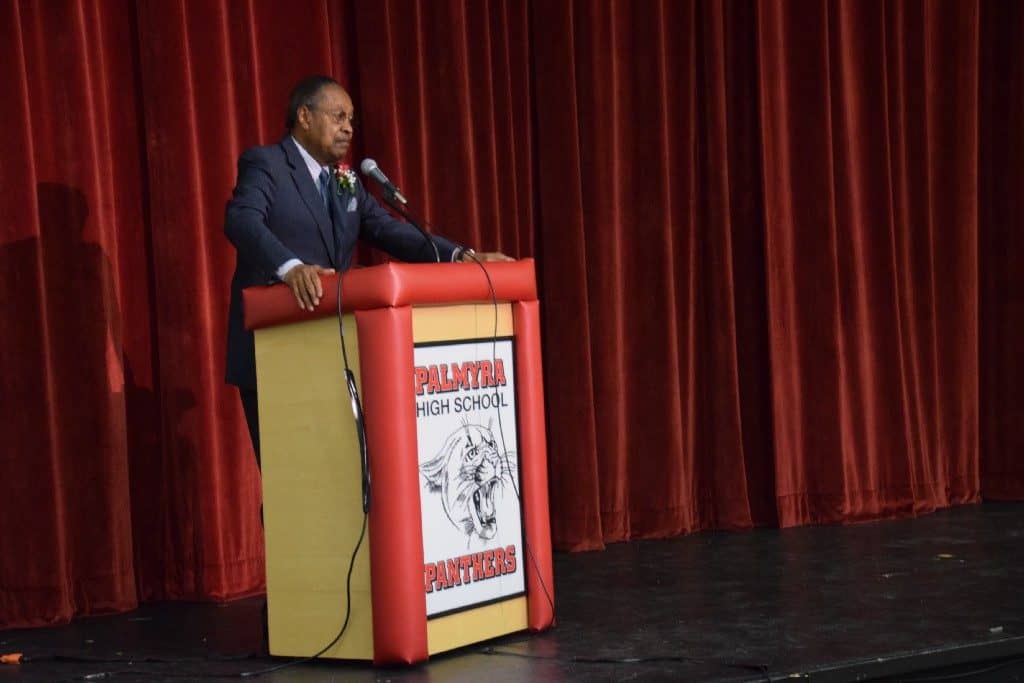
The Dr. Clarence B. Jones Institute for Social Advocacy held its first roundtable discussion on Wednesday, June 8 in the Palmyra High School Auditorium where panelists discussed the meaning of “right” and “wrong” in 2017.

The Dr. Clarence B. Jones Institute for Social Advocacy held its first roundtable discussion on Wednesday, June 8 in the Palmyra High School auditorium. The roundtable, titled “Keeping the Dream Alive: Awakening Peace, Love, Unity, Prosperity and Compassion in Communities in 2017,” featured a diverse array of speakers from Palmyra and surrounding communities who came together to discuss the importance of cultivating respect and tolerance not only in children but throughout the community.
The roundtable marked the second day of civil rights advocate Dr. Clarence B. Jones’ return to Palmyra. The Dr. Clarence B. Jones Institute was established this year in collaboration with the Palmyra School District and the Dr. James Still Preservation Trust. According to the institute’s mission statement, the goal is to create “a space that invokes community empowerment, compassion and unity through social service, research and education at the primary and secondary educational levels.”
At Tuesday’s library dedication ceremony, Superintendent Brian McBride said the scope of the institute has yet to be determined, but the goal is to create community engagement.
The roundtable was moderated by Dr. Nyeema Watson, associate chancellor for civic engagement at Rutgers University-Camden. She said the questions raised about just and equitable treatment in society are just as relevant today as they were when Dr. Martin Luther King, Jr. delivered his “I Have a Dream” speech, and so she asked the panel questions submitted from Palmyra High School students relating to whether King’s dream has been fully realized.
Jones, the 1949 valedictorian of Palmyra High School and an attorney who served as personal counsel to King, said Palmyra is a microcosm of the nation, and for that reason, local leaders need to have difficult discussions that broach uncomfortable topics.
“We have to get away from this nonsense of political correctness,” Jones said. “You know what’s politically correct? The truth.”
Panelist Imam Niaz Hannan of the Islamic Center of South Jersey urged students and community members to seek out people of different religions and walks of life. In response to a question submitted from a ninth grader asking how people can educate themselves about Islam and other religions, he said the first step is as simple as going to a library for research, talking to a Muslim neighbor or visiting a local mosque.
“We’re going to be continuously afraid of each other and have stereotypes and prejudice if we refuse to take the first step,” Hannan said.
Jones and the panelists discussed at length the importance of setting good examples for children. Jones said moral relativism has become too common in 2017, with adults providing confusing examples of what is “right” and what is “wrong.”
“We as adults — whether we like it or not — are de facto moral trustees to our children,” Jones said.
McBride, a panelist at Wednesday’s roundtable, echoed Jones’ sentiment. He said in recent years, there’s been an erosion from what is right and what is wrong. He said when communities are not sure of the difference, it’s important to have forums of open discussion such as the roundtable.
He said Jones is a perfect example because he worked against the idea that just because something happens and is accepted by a large group of people doesn’t mean it’s “right.” He said when something unjust or immoral occurs, everyone needs to take a stand whether it affects them.
“It’s not about religion; it’s not about rules of government,” McBride said. “It’s about the very basic fabric that makes us a human being.”
Jones said his experiences visiting youth detention centers have taught him that guiding youth comes down to something simple — showing them that someone cares. He said when young people feel like no one cares about them is when they lose the ability to see what’s right and wrong.
Panelist Omar Kendall, school resource officer for the Palmyra School District, said he’s seen firsthand students are hungry for knowledge.
“They always want to be taught and shown the way,” Kendall said. “When we stop doing that, that’s when we lose them.”
Panelist John Shaw, chief of the Riverton Police Department, said the greatest catalyst for impact is time.
“The greatest gift you can give to someone is your time,” Shaw said. “That time you spend with them, you’ll better understand them.”
Jones said after his departure, his goal for the institute is to encourage Palmyra and the surrounding communities to pursue justice nonviolently.
He said when the question of social injustice occurs or arises, there may come a time that students think the most immediate and appropriate answer is to have a violent response, but violence obscures and weakens any message and ultimately is a tool for the opposing party to use against them.
In regard to whether King’s dream has been accomplished, Jones had a simple but clear response.
“The direct answer to the question is we still have a lot of work to be done,” Jones said.









